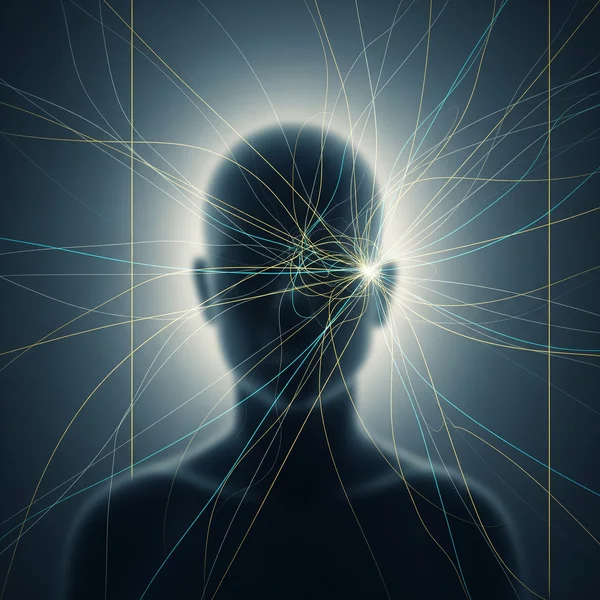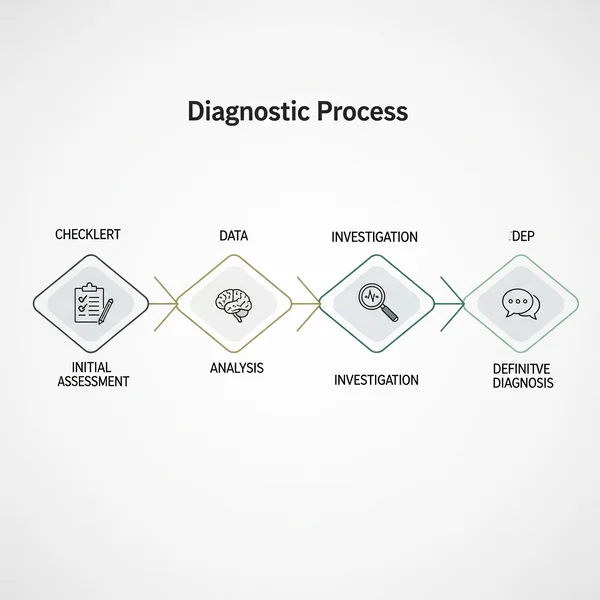How Bipolar Disorder Is Diagnosed: A Complete Guide
July 6, 2025 | By Felicity Hayes
Wondering how to test for bipolar disorder? You're not alone. The journey to understanding intense mood shifts can feel confusing and isolating. Many people start by searching for a quick answer, perhaps hoping for a simple lab test or quiz. The truth is, while preliminary tools can be incredibly helpful, a formal diagnosis is a comprehensive process conducted by a professional. This guide will walk you through exactly what that process looks like, step by step, so you know what to expect. If you're looking to organize your symptoms before speaking with a professional, a great first step is to take a confidential screening test.

Step 1: The Initial Consultation & Psychiatric Evaluation
The journey to a diagnosis begins with a conversation. This first meeting with a mental health professional, such as a psychiatrist or a clinical psychologist, is a critical psychiatric evaluation. It's not an interrogation but a collaborative effort to understand your unique experiences.
What to Expect During Your First Appointment
Your doctor will create a safe space for you to talk openly. They will ask questions about your moods, behaviors, thought patterns, and how these experiences impact your daily life, including your work, school, and relationships. Honesty is key here; the more detailed you are, the clearer the picture becomes.
The Importance of Your Personal and Family Medical History
Your doctor will inquire about your complete medical history to see if any physical conditions or medications could be causing your symptoms. They will also ask about your family's mental health history, as mood disorders like bipolar disorder can have a genetic component.
Discussing Your Symptoms: Mania, Hypomania, and Depression
This is the core of the evaluation. You'll be asked to describe your "highs" (mania or hypomania) and "lows" (depression). It can be helpful to think about specific examples. Have you ever had a period of feeling so energetic you barely slept? Or times when you felt so low you couldn't get out of bed? Effective symptom tracking beforehand can make this conversation much more productive.
Step 2: How Do They Test for Bipolar? Using Diagnostic Criteria

So, how do they test for bipolar if not with a blood test? The answer lies in established clinical guidelines. Professionals use a specific set of standards to determine if a person's experiences meet the threshold for a diagnosis.
Understanding the DSM-5 Criteria for Bipolar Disorder
In the United States and many other countries, clinicians rely on the Diagnostic and Statistical Manual of Mental Disorders, 5th Edition (DSM-5). This manual provides detailed DSM-5 criteria for bipolar I, bipolar II, and other related disorders. A diagnosis requires that your symptoms match these official descriptions.
Identifying Manic and Hypomanic Episodes
For a bipolar I diagnosis, a person must have experienced at least one full manic episode. This is a period of abnormally elevated or irritable mood and increased energy lasting at least one week, causing significant impairment. For a bipolar II diagnosis, the criteria involve at least one hypomanic episode (a less severe, shorter-lasting "high") and at least one major depressive episode.
Assessing Depressive Episodes
The "lows" are just as important. Your doctor will assess the severity and duration of your depressive episodes, which are characterized by persistent sadness, loss of interest, fatigue, and other symptoms that align with major depression.
Step 3: Ruling Out Other Conditions (Differential Diagnosis)
A key part of a responsible professional assessment for bipolar is to ensure no other condition is causing your symptoms. This process is called differential diagnosis.
Physical Exams and Lab Tests to Exclude Medical Causes
While there's no single blood test for bipolar disorder, your doctor may order lab tests. These can include a thyroid panel or other screenings to rule out medical conditions, like a thyroid issue, that can mimic the symptoms of a mood disorder. A full physical exam may also be recommended.
Distinguishing Bipolar Disorder from Depression, ADHD, and Anxiety
The symptoms of bipolar disorder can overlap with other mental health conditions. For example, the depression phase looks like major depressive disorder, and the racing thoughts of a manic episode can sometimes be confused with ADHD. A skilled clinician will carefully differentiate between these conditions to ensure an accurate diagnosis.
The Role of a Substance Use Assessment
Use of alcohol or drugs can also cause mood swings that resemble bipolar disorder. Your doctor will likely ask about your substance use to determine if it could be a contributing factor to your symptoms.
Step 4: The Role of Screening Tools like the MDQ
So where do online tests fit into all of this? They serve as valuable screening tools, not diagnostic ones. They are an excellent starting point for your journey.
What is the Mood Disorder Questionnaire (MDQ)?
Many reputable online tests, including the one offered here at bipolartest.net, are based on clinically validated instruments like the Mood Disorder Questionnaire (MDQ). The MDQ is a brief, effective screening tool designed to help identify patients who may have bipolar disorder.
How a Bipolar Test Can Help You Prepare for a Doctor's Visit
Taking a structured test helps you organize your thoughts and recall symptoms you might otherwise forget. It gives you a concrete summary of your experiences that you can share with your doctor, making your initial consultation more efficient and focused. Think of it as gathering your notes before a big meeting.
Important Disclaimer: A Screening Tool Is Not a Diagnosis
It is crucial to remember that the result of any online test is not a clinical diagnosis. It is a preliminary indicator of your risk level. Only a qualified mental health professional can provide an accurate diagnosis after a comprehensive evaluation.
Your Path Forward: From Screening to Professional Diagnosis

Understanding how bipolar disorder is diagnosed demystifies the process and can empower you to take the next step. It's not a single event but a careful, multi-faceted evaluation involving a detailed conversation, application of clinical criteria, and ruling out other causes.
Seeking clarity is a sign of strength. The journey begins with self-awareness and ends with professional guidance. You have the power to move forward on a path toward understanding and well-being.
Ready to take that first, confidential step? Use our free Bipolar Test to organize your experiences and prepare for a productive conversation with a healthcare provider.
Frequently Asked Questions about Bipolar Disorder Diagnosis
Is there a blood test for bipolar disorder?
No, there is currently no single blood test or brain scan that can diagnose bipolar disorder. The diagnosis is made through a comprehensive psychiatric evaluation, symptom review, and medical history assessment.
How long does it take to get a bipolar disorder diagnosis?
The timeline can vary. Sometimes, a diagnosis can be made after one or two thorough appointments. In other, more complex cases, it may take longer as the doctor observes your mood patterns over time.
What kind of doctor can diagnose bipolar disorder?
A psychiatrist is the medical doctor best equipped to diagnose and treat bipolar disorder. Clinical psychologists and other licensed mental health therapists can also conduct evaluations and often work in collaboration with psychiatrists.
Can an online test diagnose me?
No. An online bipolar test is a screening tool, not a diagnostic instrument. It can help you see if your symptoms warrant a professional evaluation, but it cannot replace one. To understand your symptoms better, you can try our screening tool here.